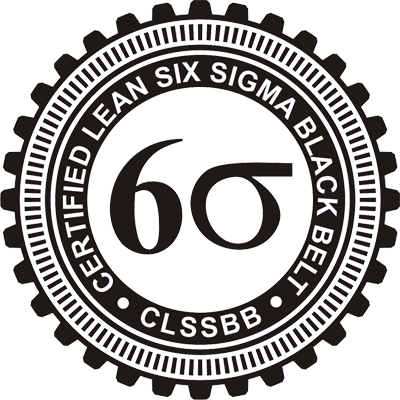A distinguishing characteristic of any organization is ensuring high-quality results. As a result, each firm should prioritize implementing the six sigma quality standards. Through the Lean Six Sigma Black Belt program, one may upskill their business efficiency and learn how to solve complex cross-functional challenges. This is done by repairing various processes that had issues in the past.
With the use of many methodologies, tools, and procedures, the Lean Six Sigma Black Belt certification program enables an organization to promote efficiency initiatives. In layman’s terms, one of the highest levels of the lean six sigma certification programs is the black belt level of the methodology. The holders are recognized as professionals who can pioneer and lead an organization toward effectiveness and profitability.
In this article, we will learn more about the prerequisites for the six sigma black belt and six sigma black belt certification requirements and how the quality management certification can help you to become a certified black belt.
What is Six Sigma Black Belt?
A professional that is proficient in explaining Six Sigma theories, principles, supporting systems, and tools is known as a Certified Six Sigma Black Belt. Black Belts should be able to manage teams, comprehend the workings of teams, and delegate tasks to team members.
A Black Belt must have a strong desire to enhance quality and a natural aptitude for using statistical tools and technology. Your mastery of the methods and tools will be solidified by obtaining a Six Sigma Black Belt, which also offers several success-enhancing skills. Black belts have the potential to be change agents, corporate strategists, and leaders.
According to Six Sigma principles, black belts are capable of understanding every facet of the define-measure, analyze, improve, and control (DMAIC) model. They understand the principles of the lean enterprise and know how to apply particular tools.
Who is a Black Belt in Six Sigma?
Certified Six Sigma Black Belts are professionals who can explain the concepts and tenets of Six Sigma as well as the underlying frameworks and tools to lead teams. A Black Belt should take the initiative in the team, keep things moving smoothly, and delegate tasks and duties to teammates. According to Six Sigma guidelines, Black Belts are fully knowledgeable about every DMAIC component. They are proficient in using specialized technology, can recognize non-value-added inputs and outputs, and have a solid understanding of Lean enterprise concepts.
What are the Requirements to Obtain Six Sigma Black Belt Certification?
- Attain Six Sigma Green Belt certification- Before being qualified for a Black Belt certification, you must first acquire your Six Sigma Green Belt if you haven’t already. In order to help candidates get ready for the Black Belt certification training, several organizations that offer Six Sigma certification may offer Green Belt refresher courses. This qualification is crucial to have before taking your Black Belt certification exam because Black Belt principles follow immediately from Green Belt applications.
- Become an expert in DMAIC, DMADV, and Six Sigma techniques- When trying to increase a company’s productivity and efficiency, it is essential to be able to describe a problem, collect and evaluate data, and enhance a process while creating controls to ensure continued success. You may be better able to obtain Six Sigma certifications if you can master these techniques
- Complete the Black Belt training- Six Sigma Black Belt certification through a corporate program, Six Sigma trainer, or approved online learning platforms might help you get ready for your exam even if it is not required. The majority of training material builds on the ideas you acquire at the Green Belt level. This could involve project management, enterprise integration and deployment, data analysis, leadership and team management, business performance metrics, and financial measures.
- Finish and submit your Six Sigma project- If you wish to take multiple Six Sigma exams, you must complete and submit a project using the most necessary tools from the Six Sigma methodology and get certified. A Six Sigma project typically restructures and improves processes in the industrial and service industries using quality improvement models that map to real performance and productivity measures. Applications in human resources, product quality analysis, industrial processes, and financial activities can all be covered by Six Sigma programs.
- Apply for your Black Belt certification- You become a Certified Six Sigma Black Belt (CSSBB) after passing your certification exam. This certification might help you get ready to enhance your knowledge to the master level by demonstrating your advanced understanding of project management and analysis methods that adhere to the Six Sigma methodology. With your Black Belt certification, you can benefit from leadership training, mentorship opportunities, and advanced instruction to put yourself in a position to pursue a Master Black Belt credential. Your chances for growth, income potential, and career possibilities may all be improved as a result.
Advantages of Six Sigma Black Belt Certification
One gains extraordinary process and analytical abilities from the Lean Six Sigma Black Belt training and certification program, which are very useful for high-level management jobs. It also helps one’s career by offering training in a variety of areas, including managerial coaching, project management, statistical analysis, and stakeholder relations. Future leaders are shaped through the training program, who will subsequently serve as the face of cultural change within an organization by having a say in decisions.
Conclusion
A Black Belt certification is mainly required for more senior technical positions, including project managers, quality managers, operations managers, and new product engineers or managers. Black Belts apply their leadership skills on a daily basis by managing teams and figuring out ways for employees to work together to implement policies and projects.
After all, when it comes to the knowledge base they have acquired and for which they have received certification, Black Belts are at the top of the Six Sigma Professionals. The six sigma black belt courses can show that you have a deep understanding of the six sigma industry and that you are qualified to advance to the six sigma master black belt certification level.
Write and Win: Participate in Creative writing Contest & International Essay Contest and win fabulous prizes.











